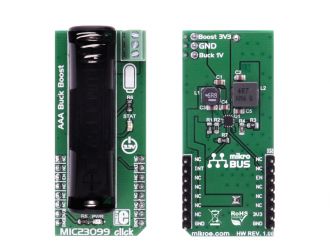
We strongly encourage users to use Package manager for sharing their code on Libstock website, because it boosts your efficiency and leaves the end user with no room for error. [more info]

Rating:
Author: MIKROE
Last Updated: 2019-04-08
Package Version: 1.0.0.1
mikroSDK Library: 1.0.0.0
Category: Boost
Downloaded: 5067 times
Not followed.
License: MIT license
MIC23099 click carries the MIC23099, a single AA/AAA cell step-down/step-up regulator with battery monitoring. The click is designed to run on a 3.3V power supply. It communicates with the target microcontroller over the following pins on the mikroBUSâ„¢ line: CS, INT.
Do you want to subscribe in order to receive notifications regarding "MIC23099 click" changes.
Do you want to unsubscribe in order to stop receiving notifications regarding "MIC23099 click" changes.
Do you want to report abuse regarding "MIC23099 click".

Library Description
The library covers all functions to control MIC23099 click board.
It offers: enable, disable, reset and check "power good" pin functions to the user.
Key functions:
Examples description
The application is composed of three sections:
void applicationTask()
{
uint8_t newStat = 0;
uint8_t oldStat = 1;
newStat = mic23099_checkPowerGood();
if ( newStat == 1 && oldStat == 0 )
{
oldStat = 1;
}
if ( newStat == 0 && oldStat == 1 )
{
mikrobus_logWrite( "Change battery and reset", _LOG_LINE );
mikrobus_logWrite( "- - - - - - - - - - - - - -", _LOG_LINE );
oldStat = 0;
}
}
Other mikroE Libraries used in the example:
UARTAdditional notes and informations
Depending on the development board you are using, you may need USB UART click, USB UART 2 click or RS232 click to connect to your PC, for development systems with no UART to USB interface available on the board. The terminal available in all MikroElektronika compilers, or any other terminal application of your choice, can be used to read the message